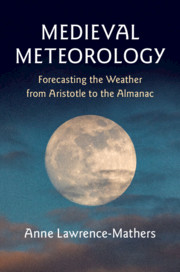Book contents
- Medieval Meteorology
- Medieval Meteorology
- Copyright page
- Contents
- Preface
- Acknowledgements
- Introduction
- 1 Recreating Meteorology in the Early Middle Ages
- 2 Meteorology, Weather Forecasting and the Early Medieval Renaissance of Astronomy
- 3 Exploratory Encounters with the Work of Arab Astronomers and Meteorologists
- 4 Meteorology, the New Science of the Stars and the Rise of Weather Forecasting
- 5 The Contested Rise of Astrometeorology
- 6 Applying the Science of Astrometeorology
- 7 Astrometeorology and Mechanisation
- 8 Weather Forecasting and the Impact of Print
- Conclusion
- Bibliography
- Index
3 - Exploratory Encounters with the Work of Arab Astronomers and Meteorologists
Published online by Cambridge University Press: 08 November 2019
- Medieval Meteorology
- Medieval Meteorology
- Copyright page
- Contents
- Preface
- Acknowledgements
- Introduction
- 1 Recreating Meteorology in the Early Middle Ages
- 2 Meteorology, Weather Forecasting and the Early Medieval Renaissance of Astronomy
- 3 Exploratory Encounters with the Work of Arab Astronomers and Meteorologists
- 4 Meteorology, the New Science of the Stars and the Rise of Weather Forecasting
- 5 The Contested Rise of Astrometeorology
- 6 Applying the Science of Astrometeorology
- 7 Astrometeorology and Mechanisation
- 8 Weather Forecasting and the Impact of Print
- Conclusion
- Bibliography
- Index
Summary
Chapter 3 gives an account of the transmission of Islamicate meteorology into Northern and Western Europe. An early phase was the collection and study of the texts known as the Alchandrean Corpus, which provided short introductions to topics within astronomy and mathematics. The chapter then considers twelfth-century translations of more advanced works, and especially of treatises on weather-forecasting. The contributions of Petrus Alfonsi, and the reception of Latin translations of Arabic versions of the works of Ptolemy, are discussed. The chapter argues that it was this period that saw the creation of Latin, Christian forms of astrologically based weather forecasting. Moreover, this was no transitory fashion, and the new, astrometeorology remained dominant until the seventeenth century. Central to this new science was the application of fundamental works by Ptolemy, and this is considered in detail. The final part of the chapter gives an outline of the works of Islamicate astrometeorology that were translated into Latin, and especially of the theories of al-Kindi. The conclusion is that Latin writers and translators searched out works on weather forecasting, and rapidly began to produce their own versions.
Keywords
Information
- Type
- Chapter
- Information
- Medieval MeteorologyForecasting the Weather from Aristotle to the Almanac, pp. 66 - 86Publisher: Cambridge University PressPrint publication year: 2019
